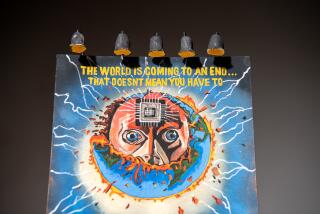Scholars Offer Study, Analysis of Apocalypse
- Share via
CHICAGO — It’s as ancient as the Dead Sea Scrolls and as modern as televangelism.
The idea of the apocalypse is rooted in centuries of religion, art, literature and science--from the book of Revelation to Dante’s writings to the threat of nuclear destruction--with depictions and predictions of the end of the world.
Now, an international team of religious scholars has assembled to provide a history and analysis of end times in the Encyclopedia of Apocalypticism. The three volumes will include more than 40 lengthy essays discussing thousands of years of biblical and secular perspectives.
The 1,500-page encyclopedia, to be published this summer, will explore topics such as Jesus and Muhammad as apocalyptic prophets, the Dead Sea Scrolls, Jewish mysticism, notions of the antichrist and images of the apocalypse in modern popular culture, from rock music and films to politics and the environment.
Despite common themes--the end of the universe, the prominence of angels and demons, the resurrection of the dead--the apocalypse has different meanings to different people.
“The apocalypse is always both positive and negative,” said Bernard McGinn, a professor of historical theology at the University of Chicago’s divinity school and the originator of the project. “There’s the fear of the end of the world and approaching doom and the hope for the coming kingdom of God on Earth.”
“The good thing about it is it focuses people,” said John Collins, also a professor at the divinity school and editor of the first volume. “It’s like your final exam. What you do to prepare depends on what you think is in the curriculum. If you’re a Christian, it’s leading the Christian life. If you’re Jewish, it’s keeping the law. If you’re Muslim, it’s something else. It serves to lend some urgency to the values of the religion.”
The idea of the apocalypse, he added, also gives the religions “a certain amount of their energy--the idea that history is going somewhere, that there is a goal, that we’re not just going around in circles.”
McGinn and Collins, along with Stephen J. Stein, chairman of the department of religious studies at Indiana University, have each edited one volume of the encyclopedia. Scholars from the United States, Italy, France, Spain, Israel and other nations contributed essays.
The three books are a chronological overview: The first volume looks at the origins of apocalypticism in Judaism and Christianity; the second, in Western history and culture; and the final one deals with the modern period.
Four years in the making, the encyclopedia arrives shortly before 2001, a pivotal time for some evangelicals who believe that the millennium will usher in the Second Coming.
But McGinn said the study of the apocalypse has meaning beyond that.
“If you turn to modern science today, what you hear is that the world is in serious danger because of global warming, the AIDS epidemic, the inability to control tuberculosis. You can go on and on,” Stein said. “Those are scientists using apocalyptic language and imagery to talk about potential devastation.”
The final volume will include essays on these secular areas, including how music, film, science fiction and television have exploited apocalyptic imagery.
“It’s just not the phenomenon of a media event like the millennium,” said McGinn. “It’s an important part of Western religion and culture.”
More to Read
Sign up for our Book Club newsletter
Get the latest news, events and more from the Los Angeles Times Book Club, and help us get L.A. reading and talking.
You may occasionally receive promotional content from the Los Angeles Times.






